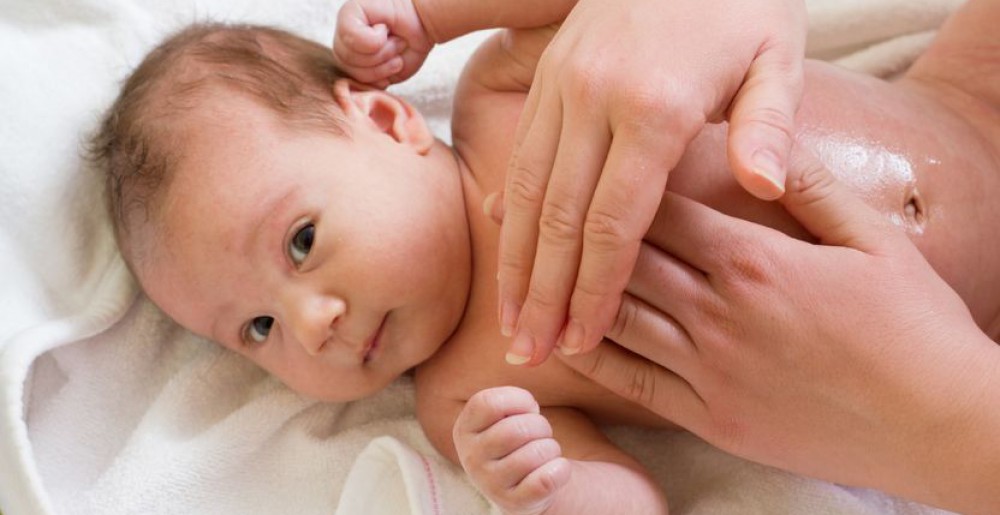Skin Stimulation Is Important for Mammals
Skin sensitivity is the earliest-developed and most fundamental functions of the body. Nurturing stimulation of the skin is, in fact, essential for adequate organic and psychological development, both for animals and for human beings. When asked what he thought of infant massage, anthropologist Ashley Montagu commented, “People don’t realize that communication for a baby, the first communications it receives and the first language of its development, is through the skin. If only most people had realized this they would have all along given babies the kind of skin stimulation they require.”
Behaviorally, mammals tend to fall into “cache” and “carry” types. The caching species leave their young for long periods while the mother gathers food. The infants must remain silent during those times so as not to attract predators, so they do not cry. For the same reason, they do not urinate unless stimulated by the mother. In addition, the young have internal mechanisms that control their body temperature. The mother’s milk is extremely high in protein and fat, and the infants suckle at a very fast rate.
In contrast, the carrying species maintain continuous contact with their infants and feed often. The babies suckle slowly, urinate often, cry when distressed or out of contact with the parent, and need the parent to keep them warm. The mother’s milk content is low in protein and fat, so infants need to suckle often. Humans are designed like the carrying species; in fact, human milk is identical in protein and fat content to that of the anthropoid apes, which are carrying species. Our infants need to be in close physical contact with us as much as possible.
No Colicky Kittens!
Physically, massage acts in much the same way in humans as licking does in animals. Animals lick their young and maintain close skin contact. Animal babies that are not licked, caressed, and permitted to cling in infancy grow up scrawny and more vulnerable to stress. They tend to fight with one another and to abuse and neglect their own young. Licking serves to stimulate the physiological systems and to bond the young with the mother. A mother cat spends more than 50 percent of her time licking her babies—and you will never see a colicky kitten! Without the kind of stimulation that helps their gastrointestinal system begin to function properly, newborn kittens die.
Scientists have seen behavior and responses in animals that parallel the growth and development of our own young, and these parallels are truly fascinating. In animals, the genitourinary tract will not function without the stimulation of frequent licking. Even the number of times a mother licks her young and the amount of time spent in each area are genetically determined.
Animals Benefit with Higher Immunity
When the infant mammal receives early skin stimulation, there is a highly beneficial influence on the immunological system. In one experiment, rats that were gently handled in infancy had a higher serum antibody standard in every case. More simply stated, these animals had a much greater ability to resist disease.
Equally important for our purposes was the behavior of these gentled rats. As Ashley Montagu wrote in Touching:
When handled, the gentled animals were relaxed and yielding. They were not easily frightened. . . . The researcher who had raised them . . . did so under conditions in which they were frequently handled, stroked, and had kindly sounds uttered to them, and they responded with fearlessness, friendliness, and a complete lack of neuromuscular tension or irritability. The exact opposite was true of the ungentled rats, who had received no attention whatever from human beings . . . these animals were frightened and bewildered, anxious and tense.
Among other important findings, rats that were gently handled for three weeks after weaning showed a faster weight gain than other rats under the same conditions, and those that were handled gently were physically much more resistant to the harmful effects of stress and deprivation.
In one study, rats with their thyroid and parathyroid glands (endocrine glands that regulate the immune system) removed responded remarkably to massage. In the experimental group, the rats were gently massaged and spoken to several times a day. They were relaxed, yielding, and not easily frightened, and their nervous systems remained stable. The control rats, which did not receive this type of care, were nervous, fearful, irritable, and enraged; they died within forty-eight hours. Another study with rats showed a higher immunity to disease, faster weight gain, and better neurological development among those that had been gently stroked in infancy.
Moving up the animal scale, dogs, horses, cows, dolphins, and many other animals have also shown remarkable differences when lovingly handled in infancy. The touch of the human hand improved the function of virtually all of the sustaining systems (respiratory, circulatory, digestive, eliminative, nervous, and endocrine) and increased “touchability,” gentleness, friendliness, and fearlessness. Writes Ashley Montagu: “The more we learn about the effects of cutaneous [skin] stimulation, the more pervasively significant for healthy development do we find it to be.”
Harry Harlow’s famous monkey experiments were the first to show that for infants, contact comfort is even more important than food. Infant monkeys were given the choice of a wire mother figure that provided food or a soft terry-cloth figure that did not provide food chose the terry-cloth mother figure. Human infants with failure-to-thrive syndrome exhibit the same type of behavior: though given all the food they need, they continue to deteriorate if they receive no intervention that involves emotional nurturing, contact comfort, and care.
In nearly every bird and mammal studied, close physical contact has been found to be essential both to the infant’s healthy survival and to the mother’s ability to nurture. In the previously mentioned studies with rats, if pregnant females were restrained from licking themselves (a form of self-massage), their mothering activities were substantially diminished. Additionally, when pregnant female animals were gently stroked every day, their offspring showed higher weight gain and reduced excitability, and the mothers showed greater interest in their offspring, with a more abundant and richer milk supply.
Skin Stimulation Is Important for Human Babies
Evidence supports the same conclusions for humans. Touching and handling her baby assists the new mother in milk production by helping stimulate secretion of prolactin, the “mothering hormone.” The process begun at the embryonic stage thus continues, allowing a natural unfolding of the baby’s potential within the safe and loving arms of his mother.
Nurturing stimulation of the skin—handling, cuddling, rocking, and massage—increases cardiac functions of the human infant. Massage stimulates the respiratory, circulatory, and gastrointestinal systems—benefits especially appreciated by the “colicky” baby and his parents.
A baby’s first experience with the surrounding environment occurs through touch, developing prenatally as early as sixteen weeks. Nature begins the massage before the baby is born. As opposed to the extremely short labors of most other animals, it has been suggested that a human mother’s extended labor helps make up for the lack of postpartum licking performed by other mammal mothers. For the human infant, the contractions of labor provide some of the same types of preparation for the functioning of his internal systems as early licking of the newborn does for other mammals.
Touch impacts short-term development during infancy and early childhood, and it has long-term effects as well. Through this contact, newborns are able to learn about their world, bond with their parents, and communicate their needs and wants. Eighty percent of a baby’s communication is expressed through body movement. When parents engage in appropriate touch, young children have an improved chance to successfully develop socially, emotionally, and intellectually.
Infants who experience more physical contact with parents demonstrate increased mental development in the first six months of life compared to young children who receive limited physical interaction. This improved cognitive development has been shown to last even after eight years, illustrating the importance of positive interactions. Infants who receive above-average levels of affection from their parents are shown to be less likely to be hostile, anxious, or emotionally distressed as adults.
Studies with premature babies using techniques similar to those taught in this book have demonstrated that daily massage is of tremendous benefit. Research projects at the University of Miami Medical Center, headed up by the Touch Research Institute’s founder, Dr. Tiffany Field, have shown remarkable results. In one study, twenty premature babies were massaged three times a day for fifteen minutes each time. They averaged 47 percent greater weight gain per day, were more active and alert, and showed more mature neurological development than infants who did not receive massage. In addition, their hospital stay averaged six days less. After many years of study and observation, the International Association of Infant Massage has established guidelines for using massage and holding techniques with premature babies.
Dallas psychologist Ruth Rice conducted a study with thirty premature babies after they had left the hospital. She divided them into two groups. The mothers in the control group were instructed in usual newborn care, while those in the experimental group were taught a daily massage and rocking regime. At four months of age, the babies who had been massaged were ahead in both neurological development and weight gain.
The natural sensory stimulation of massage speeds myelination of the nerves in the brain and the nervous system. The myelin sheath is a fatty covering around each nerve, like insulation around electrical wire. It protects the nervous system and speeds the transmission of impulses from the brain to the rest of the body. The process of coating the nerves is not complete at birth, but skin stimulation hastens the process, thus enhancing rapid neural-cell firing and improving brain-body communication.
In 1978 transcutaneous oxygen monitoring was developed, which enabled physicians to measure oxygen tension in the body through an electrode on the skin. It was discovered that hospitalized infants experienced tremendous upheavals in oxygen levels when subjected to stress. Touch Relaxation, holding techniques, and massage (as covered in my book Infant Massage: a Handbook for Loving Parents) have been found to mitigate these fluctuations, and these methods are being used in hospitals routinely now to help infants maintain a steady state through the stresses of diaper changes, heel sticks, and other intrusions.
New research demonstrates similar results every day, confirming what age-old tradition has told us: infants need loving touch. Lawrence Schachner, M.D., a professor in the Department of Dermatology and Cutaneous Surgery at the University of Miami School of Medicine, advises that touch can benefit babies with skin disorders such as eczema. “It may furthermore improve parent-baby interaction,” he says. Dr. Tiffany Field concurs. She notes that loving touch triggers physiological changes that help infants grow and develop, stimulating nerves in the brain that facilitate food absorption and lowering stress hormone levels, resulting in improved immune system functioning. A report by the Families and Work Institute states that the vast majority of connections between brain cells are formed during the first three years of life. The report concludes that loving interaction such as massage can directly affect a child’s emotional development and ability to handle stress as an adult.
Loving skin contact and massage benefit mothers and fathers as well. In addition, research has shown that mothers whose pregnancies were filled with chronic stress often have babies who cry more and for longer periods than those whose pregnancies were peaceful and supported.
Men who make the effort to bond with their infants by giving the mother loving massages, talking and singing to the baby, feeling its movements in their partner’s belly, attending classes with their partner, and reading up on infant development and psychology tend to be more attentive and accomplished fathers.



Great post
LikeLike
Thank you! My book, INFANT MASSAGE: A HANDBOOK FOR LOVING PARENTS has just been released from Random House in its 4th edition – updated, expanded, revised.
LikeLike